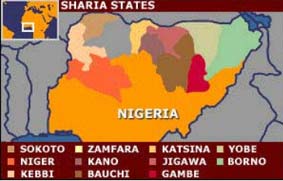|
||||||||||||||||||||
|
||||||||||||||||||||
|
Nigeria Sharia architect defends law 22/03/02 Penalties can include amputation, flogging and stoning
The governor of a northern Nigerian state which enforces Sharia law has defended Islamic punishments after they were criticised by the federal government. In an interview with the BBC, Governor Ahmed Sani of Zamfara said no non-Muslim had the right to determine Sharia's legitimacy. Islam is a faith, a belief - it is only those who believe in that faith that will either determine something is wrong or something is right Ahmed Sani
Federal Justice Minister Kanu Agabi said in a letter to northern states that Muslims should not be subjected to more severe punishments than other Nigerians. The letter comes as Nigeria is gripped by the trial of a woman, Safiya Husseini, convicted of adultery and sentenced to death by stoning by an Islamic court. She is due to hear the outcome of her appeal next week. Click here for a map of Sharia states Immense international pressure both from governments and human rights groups over the case seems to have persuaded the federal government to come out against strict Sharia. Fine points Mr Sani, considered to be one of the architects of the new strict laws, says the Nigerian constitution specifically allows for the implementation of Islamic law. Sani: Punishments legal under the constitution "Islam is a faith, a belief - it is only those who believe in that faith that will either determine something is wrong or something is right," he said. "We should all allow each other to practise our religion the way it is in our holy books." The BBC's Dan Isaacs says this argument over the finer points of the constitution allows both sides to retain their position and neither shows any signs of backing down. Battle for votes The letter, which signals an important shift in government policy, makes no reference to any specific case. Mr Agabi's letter, quoted in several Nigerian newspapers, says that any court "which imposes discriminatory punishment is deliberately flouting the constitution". "The stability, unity and integrity of the nation are threatened by such action," the minister said. Safiya Husseini gave birth outside marriage Criminal punishments under Sharia have been introduced in many of Nigeria's majority Muslim northern states over the past two years. President Obasanjo received significant support from northern Muslims at the last election, although he himself is a Christian from the south. Our correspondent says that a combination of Mr Obasanjo's personal distaste for Sharia punishments, and hard-nosed calculation of votes to be won among those disillusioned with Sharia have swayed the federal government to make its first condemnation of harsh Islamic penalties. A ruling on the adultery case of Safiya Husseini is expected on Monday. The case has provoked widespread international concern and calls for clemency. President Obasanjo has himself made it clear he would prefer the sentence not to be carried out. |
||||||||||||||||||||


 He
said that the punishments - which included stoning, amputation and
flogging - were legal under the constitution and his administration had
no plans to change its justice system.
He
said that the punishments - which included stoning, amputation and
flogging - were legal under the constitution and his administration had
no plans to change its justice system.